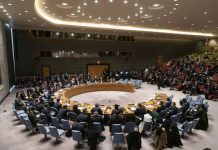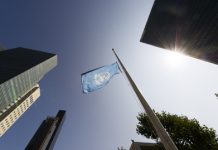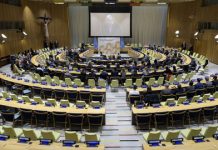“We need greater global solidarity today and with future generations, better management of critical issues of global concern and an upgraded United Nations that can meet the challenges of a new era,” he said at the Summit of the Future Global Call event, emphasising that current institutions can not keep up with the changing times.
At the landmark summit, Member States are expected to conclude negotiations ahead of adopting the Pact for the Future, which aims to chart a path toward achieving the Sustainable Development Goals (SDGs) and respond to emerging challenges and opportunities. It will include a Global Digital Compact and a Declaration on Future Generations.
The SDGs are an internationally agreed set of targets to end poverty, protect the planet and ensure that by 2030 all people enjoy peace and prosperity.
While the summit is just days away, scheduled to take place on 22 and 23 September, it has taken years of effort to get to this point, Mr. Guterres said.
‘Stuck in a time warp’
Today’s challenges are moving at speeds far too fast for the current tools to solve them due to outdated institutions that are “designed for another era and another world”, the UN chief warned.
“The Security Council is stuck in a time warp, international financial architecture is outdated and ineffective and we are simply not equipped to take on a wide range of emerging issues,” he stated.
Mr. Guterres underscored the world’s ongoing ferocious conflicts, deepened geopolitical divides, the rise of populism and extremism and the crisis levels of poverty among the most pressing issues at a time when the SDGs continue to slip out of reach.
“Twenty-first century challenges require twenty-first century problem-solving institutions,” he emphasised, adding that the summit also provides an opportunity to reform the Security Council and international financial architecture.
Calls for ‘vision, courage, solidarity’
In order to achieve the summit’s goals, the UN chief is calling on Member States to “act swiftly, with vision, courage, solidarity and a spirit of compromise” in order to get the three draft agreements “over the finish line”.
He praised the UN as a unique platform to convene key stakeholders, especially in times of global upheaval.
The need to address the changing nature of warfare, to manage the risks of new technologies and to recognise the ongoing climate crisis as a “threat multiplier of insecurity” was also brought to the forefront.
“I appeal to all governments to make sure they are as ambitious as possible to restore the hope and trust we need in order to address the dramatic challenges of our time with a new global consensus,” he urged.
The ‘Global Call’
At the live event, Mr. Guterres was joined by the President of Namibia, Nangolo Mbumba, and the Chancellor of Germany, Olaf Scholz, as co-facilitators of the preparatory process.
Both President Mbumba and Chancellor Scholz helped promote the event as an opportunity to hear Member States’ voices on the highest political level about their aspirations for the Pact for the Future and the summit while also reiterating their own hopes for the next generations.
“The summit should be a platform for bold ideas and concrete commitments that will reinvigorate the UN and multilateralism for the 21st century,” President Mbumba said.
“We stand at the crossroads between breakdown and breakthrough. I’m sure that we will make the right choice,” said President Scholz, adding that it is time to show the world that “there is much more that unites us than divides us.”
Source of original article: United Nations (news.un.org). Photo credit: UN. The content of this article does not necessarily reflect the views or opinion of Global Diaspora News (www.globaldiasporanews.com).
To submit your press release: (https://www.globaldiasporanews.com/pr).
To advertise on Global Diaspora News: (www.globaldiasporanews.com/ads).
Sign up to Global Diaspora News newsletter (https://www.globaldiasporanews.com/newsletter/) to start receiving updates and opportunities directly in your email inbox for free.




























